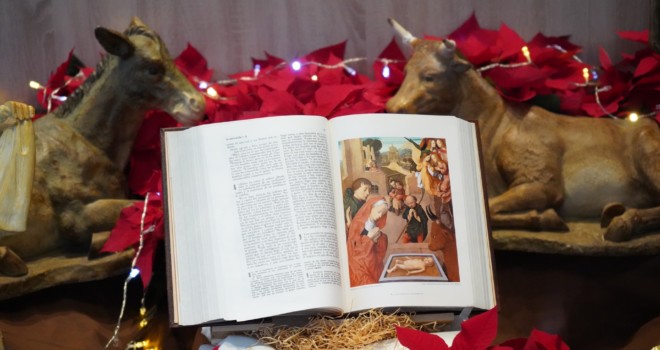On this last Sunday in Advent, we have a living example of how to best receive the Lord when He comes.
Gospel (Read Lk 1:39-45)
Our Sunday Gospel readings in Advent have given us much instruction about how to prepare for the coming of the Lord. Jesus told us the importance of being awake and vigilant, not to let that day catch us “by surprise like a trap” (see Lk 21:34). John the Baptist taught us the need to be attentive to our sin and to be active in overcoming it. We were reminded that even in this penitential season, we are to heed the words of St. Paul: Rejoice! Today, we get a different kind of preparation: we watch a scene unfold that shows us the first human responses to a visitation from the Lord, and it is full of wisdom for us as Advent comes to an end.
This is a scene very familiar to us. After the Annunciation, Mary visits her cousin, Elizabeth, who is miraculously pregnant with John the Baptist, the one who would prepare the way of the Lord. As soon as Mary’s greeting reaches Elizabeth’s ears, the baby in her womb “leaped for joy,” and she was “filled with the Holy Spirit.” We should remember that Elizabeth and Zechariah are described earlier in St. Luke’s Gospel as “righteous before God, walking in all the commandments and ordinances of the Lord blamelessly” (see Lk 1:6). We know that when Gabriel visited Zechariah as he was ministering in the Temple to announce the news of the birth of John, Zechariah’s faith failed him. He did not believe that the impossible could happen, and he lost his ability to speak as punishment. We have to wonder if Elizabeth, when Zechariah communicated with her about what the angel had said, was more credulous. Here, she immediately recognizes Mary as “the mother of [her] Lord.” There is no disbelief here in this Spirit-filled woman.
Elizabeth blesses both Mary and the fruit of Mary’s womb in Her Spirit-led greeting. What a wonderful instruction this is to us! It takes us all the way back to Genesis, when God vowed that to defeat His enemy, the serpent, “a woman” and “her seed” would someday finish the battle begun in Eden. Elizabeth recognizes that they have now appeared. Her response is one of gratitude that comes from humility. Even though she, herself, is full of the Holy Spirit, she asks, “How does this happen to me, that the mother of my Lord should come to me?” She tells Mary that the babe in her womb responded in joy merely at the sound of Mary’s voice. John, in utero, recognized that God’s plan of salvation for the whole human race had been set in motion in the now-pregnant Mary.
See how Elizabeth praises Mary’s faith: “Blessed are you who believed that what was spoken to you by the Lord would be fulfilled.” Elizabeth knew, of course, in a very real way the difficult test of faith that comes when we are asked to believe the impossible. Her husband’s long period of being mute was a daily reminder. In Eden, the faith of Adam and Eve failed, too. They did not believe God’s word about the forbidden fruit. It makes delicious sense (yes, pun intended) that the first person to receive “the woman” and “her seed” extols the woman’s faith. In time, the faith of the woman’s “seed” would be tested to the limit, but His, like His mother’s, would not fail.
So, what do we learn from this scene as we draw near to the celebration of the Lord’s First Advent and wait with patience for His Second Advent? Elizabeth teaches us that to properly receive Him, we need to be in a state of grace (“filled with the Holy Spirit”), willing to be done with the sin that turns us away from God’s love. In her blessing on “the woman” and “her seed” (now “fruit”) of Genesis, Elizabeth reminds us that no matter how long it takes or what transpires in the history that moves us through time, God will keep all His promises to us. In her thankful humility, she gives us an example of the proper posture for people like us as we anticipate the Lord’s visitation. We know we aren’t worthy to receive Jesus even to enter under our roof, but we are full of gratitude that He chooses to come and heal us. In her praise of Mary’s faith, she encourages us to do resolutely what Mary did at the Annunciation—she believed and accepted God’s promise and went “in haste” to fulfill her calling to share Him with others. Finally, we cannot miss the resounding joy of this scene. Are we ready now, after four weeks of Advent, to welcome Jesus and Mary afresh into our lives with joy this Christmas? Elizabeth gives us the words we need: “Blessed are you among women, and blessed is the fruit of your womb!”
Possible response: Heavenly Father, help me to welcome Your Son with joy and trust in all His promises.
First Reading (Read Micah 5:1-4a)
Here is one of the great Messianic prophecies of the Old Testament. In it, we see the future appearance of a mother (“she who is to give birth has borne”) and a magnificent Shepherd for Israel. This event, “whose origin is from of old” will take place in the tiny town of Bethlehem. The stage is set! A Child will grow and lead His people “by the strength of the LORD, in the majestic name of the LORD.” At His first coming, Jesus was the humble infant born to a poor family, the son of a carpenter. He did His work in great lowliness and died a shameful death. The grave could not hold Him, however. He rose in glory, departed in glory, and will return in glory that “shall reach the ends of the earth; He shall be peace.” Advent has taught us to keep both His comings alive in our hearts and minds. Jesus is not done with this world yet.
Possible response: Lord Jesus, You want to come back to this world out of love. Help me have that same love, too.
Psalm (Read Ps 80:2-3, 15-16, 18-19)
Here we find the longing of Israel for their Messiah. The psalm laments the faithlessness of God’s people that turned them away from Him: “Lord, make us turn to You.” It also expresses the deepest desire of the “vine” God’s “right hand has planted,” which we sing today in the response: “Let us see Your face and we shall be saved.” A defeated people knew God was their only hope: “Rouse Your power, and come to save us.” Israel believed that if only God would visit them, “Then we will no more withdraw from You.”
So, God answered their cry. Centuries after this psalm was written, the “Son of Man,” who came to set things right, lay in a manger in Bethlehem, revealing God’s face. Soon, we will celebrate that coming; we will say to this Child, “give us new life, and we will call upon Your Name.
Possible response: The psalm is, itself, a response to our other readings. Read it again prayerfully to make it your own.
Second Reading (Read Heb 10:5-10)
This reading reminds us why “Christ came into the world.” He came to do what no one in Israel ever had or ever could do: He obeyed God’s law perfectly. Therefore, He could be a perfect sacrifice for sin. The Old Covenant prescribed animal sacrifices for sin, but they were simply a preparation. Jesus came into the world to rescue us from the bondage of sin and death. His was a rescue mission. Yet He did much more than rescue us when He offered Himself on our behalf: “We have been consecrated through the offering of the body of Jesus Christ once for all.” “Consecrated” mleans to be set apart for holy work. It is an Old Testament term used to describe people or objects dedicated to priestly, liturgical work. Jesus’ mission was also a restore and renew mission. When we celebrate the birth of the Savior, we celebrate His birth as well as our own. He has enabled us to be born anew to a life set apart for God.
“Come, Lord Jesus.” We have been waiting for You.
Possible response: Lord Jesus, in this new liturgical year, I know You have called me to Your work. Please help me re-commit myself to it.
✠













